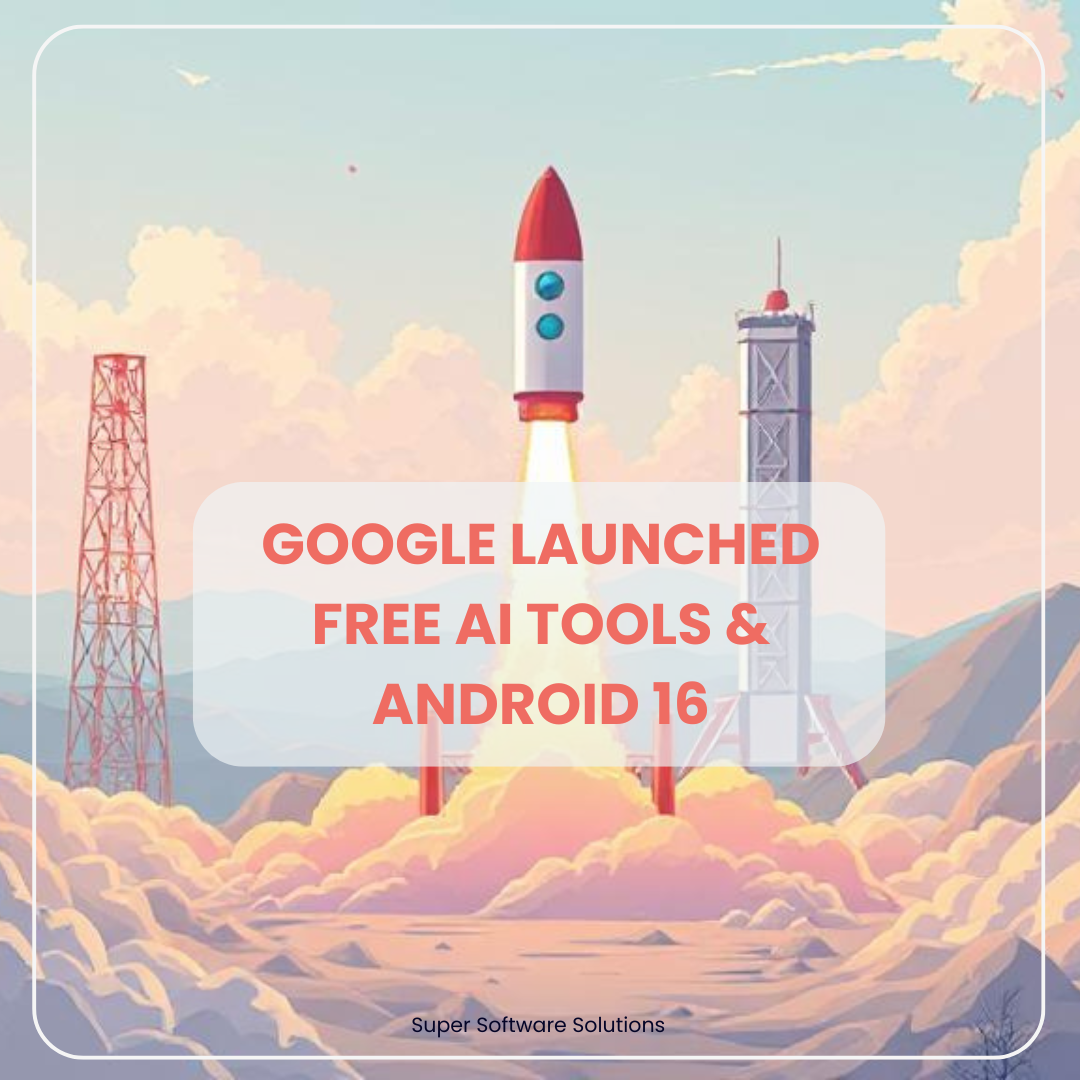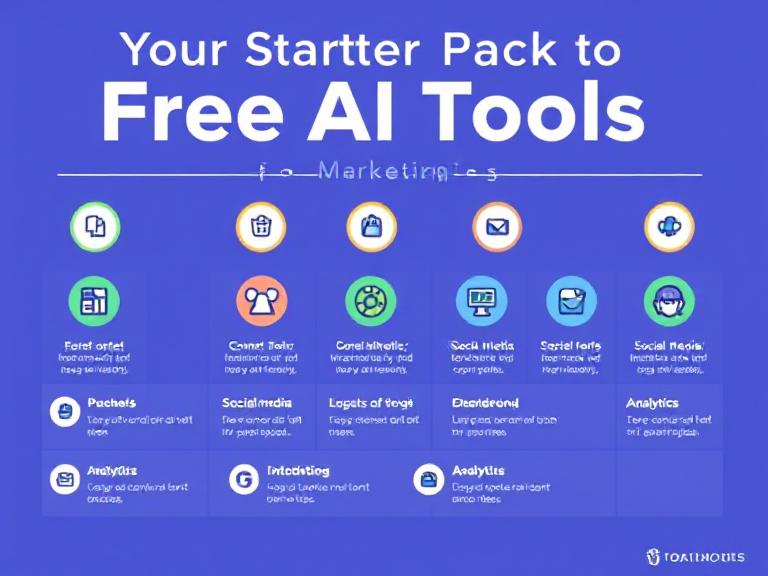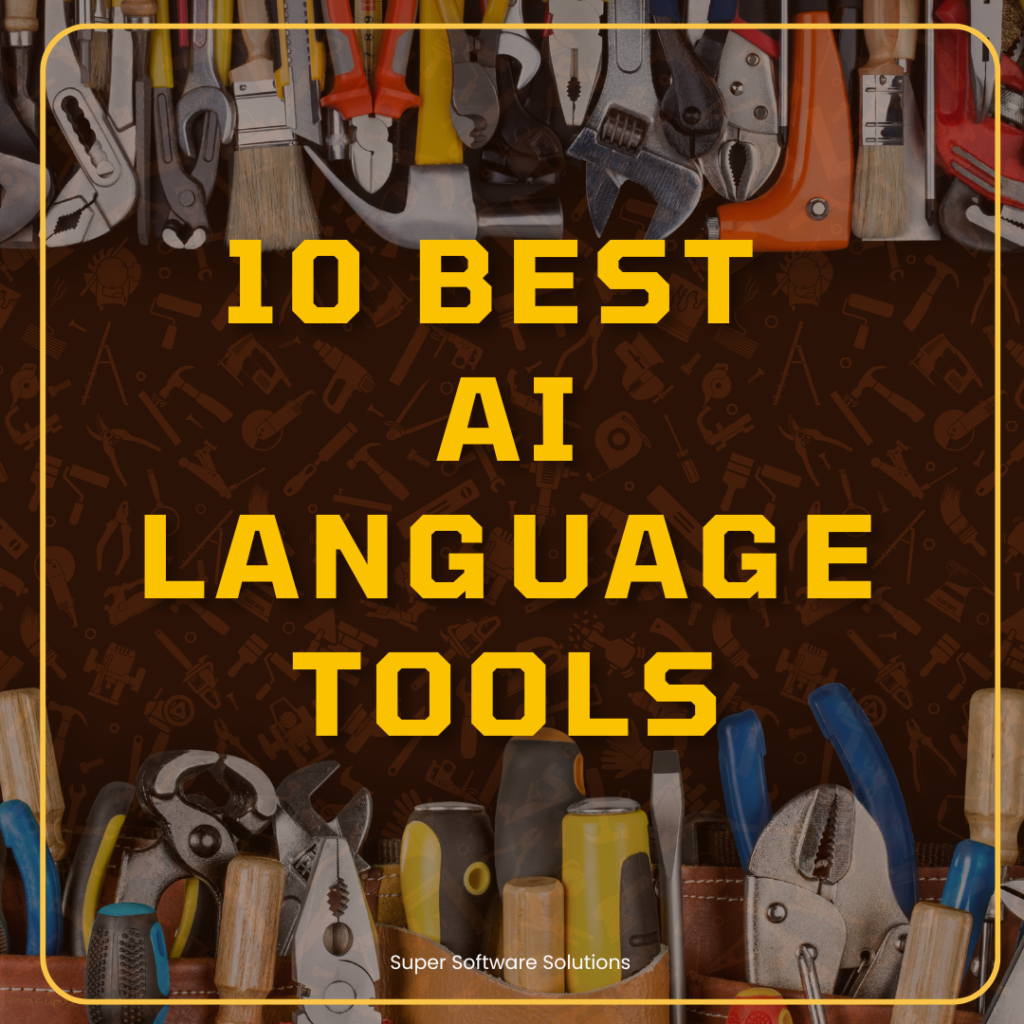Introduction The AI Tsunami – Google Launched Free AI Tools & Android 16
The tech world is still buzzing from the seismic announcements at Google I/O 2025! If you thought AI was already moving fast, buckle up. Google has just supercharged the AI revolution, and the best part? Many of these groundbreaking capabilities are coming to you for free. Alongside these powerful new AI offerings, the curtain has been lifted on Android 16 (2025), an operating system deeply infused with artificial intelligence, promising a more intuitive, proactive, and seamlessly connected mobile experience. This isn’t just an update; it’s a glimpse into a future where Google’s ecosystem works in perfect harmony, powered by accessible AI. This post dives deep into what Google Launched Free AI Tools & Android 16 2025 means for you, for developers, and for the very fabric of our digital lives.
Table of Contents
Google Unleashes a New Era of Free AI Tools (Announced at I/O 2025)
Google Launched Free AI Tools isn’t just about incremental improvements; it’s a quantum leap. While premium tiers like “Google AI Ultra” exist for power users, the core message from I/O 2025 was clear: powerful AI for everyone. Many of the foundational models and tools are being offered with significant free access, democratizing capabilities that were once the domain of specialized researchers.

Gemini 2.5: The Smarter, More Accessible AI Brain
At the heart of Google’s AI advancements is Gemini 2.5, their next-generation multimodal AI model. It comes in various sizes, including the highly efficient Gemini 2.5 Flash and the powerful Gemini 2.5 Pro.
- Enhanced Capabilities: Gemini 2.5 boasts significantly improved reasoning (with a new “Deep Think” mode for Pro), coding proficiency, and understanding of long context. It can process and generate text, code, images, audio, and video with unprecedented accuracy and nuance.
- Free Tier Access: While the most advanced features might be part of premium plans, the core Gemini models and their capabilities are increasingly integrated into Google’s free products and services. This means everyday users will experience a smarter Google Assistant, more helpful Search, and more capable creative tools without necessarily opening their wallets. Developers also benefit from generous free tiers via the Gemini API.
- Real-World Impact: Imagine drafting complex emails with AI assistance that truly understands your style, or generating code snippets that are not just functional but optimized. Google reported a staggering 50-fold increase in token processing across its products and APIs in the last year, now at over 480 trillion tokens a month, indicating massive adoption and utility. Over 7 million developers are already building with Gemini.
AI Mode in Search: Your Free, Intelligent Research Partner
Google Search is undergoing its most significant transformation in years with the introduction of “AI Mode.”
- Conversational & Complex Queries: Forget just keywords. AI Mode allows you to ask long, complex, multi-part questions and get comprehensive, synthesized answers. It’s like having a conversation with a research assistant.
- Visual & Synthesized Results: Instead of just a list of blue links, AI Mode can generate summaries, compare information, and even create visualizations or charts on the fly to help you understand complex topics.
- Free for All: This powerful upgrade to Google Search is rolling out to users for free, fundamentally changing how we access and interact with information online. As Sundar Pichai, Google’s CEO, often emphasizes, their goal is to organize the world’s information and make it universally accessible and useful – AI Mode is a huge step in that direction.
Project Astra: The Proactive, Seeing AI Assistant (with Free Core Functionality)
Perhaps one of the most futuristic announcements was Project Astra. This isn’t just another voice assistant; it’s envisioned as a universal AI assistant.
- Sees What You See: Using your phone’s camera (with your permission, of course), Project Astra can “see” and understand the world around you in real-time. It can identify objects, understand context, and offer help proactively.
- Agentic Capabilities: Astra aims to go beyond answering questions to actually doing things for you. Imagine pointing your camera at a broken appliance, and Astra not only identifies the problem but also finds repair tutorials or local services.
- Accessibility: While the full extent of its features is still unfolding, the integration of Astra’s foundational capabilities into the core Android experience suggests that many of its benefits will be available freely, making everyday tasks significantly easier.
Creative Power for All: Imagen 4 & Veo 3 (Accessible Innovation)
Google is also democratizing content creation with its latest generative AI models:
- Imagen 4: This text-to-image model boasts incredible improvements in rendering realistic images, understanding complex prompts, and even generating coherent text within images.
- Veo 3: Taking it a step further, Veo 3 is a text-to-video model that can generate high-quality video clips, complete with accompanying audio and sound effects, from simple text descriptions.
- Free Exploration & Integration: While high-volume or commercial use might involve costs, Google often provides free credits, trial periods, or integrates these tools into applications like Google Slides or even the Gemini app for users to experiment and create. The aim is to put powerful creative tools into more hands.
AI-First Google Colab: Supercharging Developers & Researchers for Free
Google Colaboratory (Colab) has long been a favorite for developers and researchers, offering free access to GPUs and TPUs. Now, it’s becoming an AI-first platform.
- Agentic Collaborator: The new Colab, powered by Gemini, acts as an intelligent coding partner. It understands your code, your intent, and your goals, offering suggestions, generating boilerplate, and even helping debug errors.
- Enhanced Data Science Agent: Analyzing data and uncovering insights becomes easier with an upgraded Data Science Agent integrated into Colab.
- Continued Free Access: The core promise of Colab – free access to powerful computational resources and a collaborative environment – remains, now significantly enhanced with AI assistance. This is a massive boon for students, individual developers, and researchers worldwide.
Gemma 3n: Open & On-Device AI Innovation for Free
Reinforcing its commitment to the open-source community, Google introduced Gemma 3n.
- Mobile-First Architecture: Gemma is a family of lightweight, state-of-the-art open models designed to run efficiently on-device (phones, laptops). Gemma 3n is built on a new, advanced mobile-first architecture.
- Privacy and Speed: On-device processing means faster responses and enhanced user privacy, as data doesn’t always need to travel to the cloud.
- Free and Open: Being open models, Gemma can be freely used, modified, and distributed by developers, fostering a new wave of AI-powered applications that respect user privacy and offer low-latency experiences.
Android 16 (2025) Arrives: AI-Infused, Intuitive, and More Connected
Alongside the suite of AI tools, Google proudly presented Android 16 (2025). This isn’t just an iterative update; it’s an operating system re-imagined for the AI era. The keyword phrase Google Launched Free AI Tools & Android 16 2025 truly comes to life here, as Android 16 is designed to seamlessly leverage these new AI capabilities.
Material 3 Expressive & UI Enhancements: A More Personal Touch
Android 16 introduces “Material 3 Expressive,” the next evolution of Google’s design language.
- Vibrant and Customizable: Expect more vibrant color palettes, adaptive layouts that better suit individual devices, and more personalized UI elements. The OS will feel more dynamic and responsive.
- Fluid Interactions: Smoother animations, responsive fonts, and improved haptic feedback will make interactions feel more natural and intuitive.
- Resizable Tiles & Quick Settings Revamp: Greater customization in Quick Settings, including resizable tiles, will allow users to tailor their device controls more effectively.
The AI Core: Deep Gemini Integration in Android 16
The true game-changer in Android 16 is its deep, system-level integration of Gemini AI.
- Proactive Assistance: Gemini won’t just be in apps; it will be part of the OS fabric. This means more intelligent suggestions, proactive assistance based on your context, and a system that learns and adapts to your usage patterns.
- On-Device AI Power: Leveraging models like Gemma 3n, Android 16 will perform more AI tasks directly on your device, enhancing speed, responsiveness, and privacy.
- Seamless App Experiences: Developers will have new APIs to tap into Android 16’s AI core, enabling them to build smarter, more context-aware applications that integrate seamlessly with the OS-level AI.
Smarter Living: Enhanced Notifications & Hub Mode
Android 16 is set to make your digital life more manageable and your device more useful, even when idle.
- Live Updates in Notifications: Track a food delivery, a ride-share arrival, or a flight status directly within the notification shade with real-time progress updates, reducing the need to constantly open apps.
- Hub Mode / Standby Mode: Taking inspiration from smart displays, Android 16 will introduce a “Hub Mode.” When your phone is docked and charging (especially with new Qi2 magnetic wireless chargers enabling easy landscape orientation), it can transform into a smart display.
- Display clocks, photos, and revitalized lock screen widgets.
- Access Google Assistant and control smart home devices.
- This feature will make your phone a useful information hub even when you’re not actively using it.
- FindHub: The “Find My Device” system is rebranded to “FindHub,” expanding capabilities to locate not just your gadgets but also items like luggage (through partnerships), even offering satellite support for location without cellular coverage.
Android XR & Wear OS 6: Expanding the Intelligent Ecosystem
Google’s AI ambitions extend beyond the smartphone.
- Android XR: A new operating system tailored for extended reality (XR) devices like smart glasses. Built in the “Gemini era,” Android XR will support immersive, AI-powered experiences, with Gemini enabling devices to understand and respond to the user’s point of view. Early demos showcased smart glasses offering real-time translation, navigation, and contextual information.
- Wear OS 6: The latest update for smartwatches, designed for circular displays, brings improved aesthetics, better performance, and up to 10% longer battery life. Deeper Gemini integration means your smartwatch will become an even more helpful and proactive companion.
Privacy and Security in the Age of AI-Powered Android
With increased AI capabilities comes a heightened focus on privacy and security.
- On-Device Processing: As mentioned, more AI tasks will run locally, keeping your personal data on your device.
- Transparent Controls: Google emphasizes user control over data and AI features. Expect clear permissions and easy-to-understand settings for managing how AI uses your information.
- AI-Powered Threat Detection: Android 16 will likely leverage AI to enhance its security features, proactively identifying and neutralizing new threats.
The Symbiotic Revolution: How Google’s Free AI Tools and Android 16 Will Work Together
The true magic of what Google Launched Free AI Tools & Android 16 2025 lies in the synergy between these elements. They aren’t standalone innovations but parts of a cohesive, intelligent ecosystem.
- Project Astra on Android 16: Imagine Project Astra’s capabilities deeply embedded in Android 16. Your phone’s OS could understand visual information from your camera and seamlessly integrate it with your apps and workflows – helping you identify plants on a hike and then automatically adding them to a shared notes app, or translating a menu in real-time and then helping you book a reservation.
- AI-Enhanced Apps: Developers using the new AI-first Google Colab and the Gemini API can build applications for Android 16 that are more personalized, context-aware, and efficient. Think educational apps that adapt to your learning style in real-time, or productivity tools that automate complex tasks based on your current project.
- Creative Tools on the Go: With Imagen 4 and Veo 3 accessible through various Google services, and Android 16 providing a more powerful and intuitive platform, creating and sharing rich media content directly from your mobile device will become easier and more sophisticated.
- Smarter Search Everywhere: AI Mode in Search won’t be confined to the browser. Its intelligence will likely permeate Android 16, offering more insightful information and answers whether you’re searching within an app, the settings menu, or your files.
- Seamless Cross-Device Experiences: With Android 16 on phones, Wear OS 6 on watches, and Android XR on glasses, all powered by Gemini and connected through the Google ecosystem, expect more fluid and intelligent interactions across all your devices. Your AI assistant will have consistent context and capabilities, no matter which device you’re using.
Broader Implications: Google’s Vision for an AI-First Future
The announcements from I/O 2025 surrounding Google Launched Free AI Tools & Android 16 2025 signal more than just new products; they outline Google’s ambitious vision.
- Democratization of AI: By offering powerful Google Launched Free AI Tools & Android 16 and models with significant free access, Google is lowering the barrier to entry for developers, creators, and everyday users. This fosters innovation from a wider range of people and can lead to solutions for diverse problems.
- Impact on Developers: The AI-first Colab, enhanced Gemini APIs, and open models like Gemma provide developers with unprecedented power to build next-generation applications. This will spur a new wave of AI-driven innovation across the app ecosystem.
- Transformation of Daily Life: From how we search for information and manage our schedules to how we create content and interact with our devices, these AI advancements will subtly but profoundly change our daily routines, aiming for greater efficiency and richer experiences.
- The Competitive Landscape: These moves by Google will undoubtedly heat up the AI race. Competitors will be pushed to innovate and offer similarly powerful and accessible AI solutions, ultimately benefiting consumers and businesses with more choices and better technology.
- Ethical Considerations: As AI becomes more pervasive, discussions around ethics, bias, privacy, and job displacement will become even more critical. Google has stated its commitment to responsible AI development, but ongoing societal dialogue and robust safeguards will be essential. A quote often attributed to tech ethicists is, “With great power comes great responsibility,” and this is truer than ever in the age of advanced AI.
Conclusion: Embracing the Google Launched Free AI Tools & Android 16
The wave of innovation from Google Launched Free AI Tools & Android 16 2025 is undeniably transformative. We’re standing at the cusp of a new era where AI is not just a feature but the fundamental fabric of our digital experiences. The emphasis on free access for many of these powerful tools means that this revolution will be more inclusive, empowering individuals and developers worldwide.
Google Launched Free AI Tools & Android 16 , promises a mobile experience that is more intelligent, intuitive, and helpful than ever before. The synergy between these new AI tools and the next generation of Android will unlock new possibilities, streamline our lives, and empower our creativity.
The future Google painted at I/O 2025 is ambitious and exciting. While the journey of AI is ongoing, with challenges and ethical considerations to navigate, the potential for positive impact is immense.


